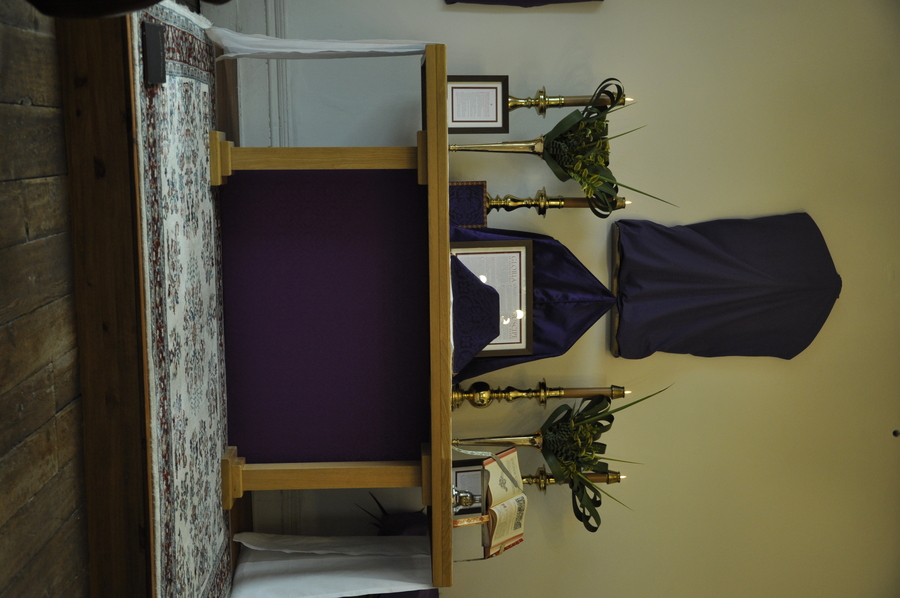Blessed Schuster’s Daily Thoughts on the Rule: Passion Sunday
Passion Sunday
Station at St Peter’s
Jesus before Abraham Was
1. On this night the Sacred Ordinations were celebrated, and therefore the Station is again at St Peter’s.
The Divine Master teaches us a secure criterion for knowing the spirit of a person.
He who is of God listens to the voice of God. You therefore—He says to the Jews—are not of God, because you do not want to hear Me.
The good monk, of a good spirit, willingly listens to the word of God in prayer, in meditation, in pious readings, in spiritual Conferences.
When, on the other hand, a religious experiences disgust with the divine word, it is a very bad symptom, which indicates that sadly he is not of God. Propterea vos non audistis, quia ex Deo non estis. (John 8:47: ‘For this reason you do not listen, because you are not of God.’)
This is the reason why, among the instruments of the Spiritual Art, the Holy Patriarch [Saint Benedict] likewise recommends to us: Lectiones sanctas libenter audire. Orationi frequenter incumbere. (Rule, Ch. 4: ‘To listen frequently1 to pious readings. To attend frequently to prayer.’)
***
2. To him who loves the word of God, the Logos promises today a reward worthy of Himself. Si quis sermonem meum servaverit, mortem non videbit in aeternum. [John 8:51: ‘If anyone keep My word, he will not see death forever.’—Tr.]
The Logos, Who, as Saint Hippolytus assures us, is born continually in the souls of the just, becomes in them a vital principle of immortality, which defends them from the ambushes of the devil.
It strengthens them in their work regarding the mission particularly entrusted to them, and finally it lifts them up to the heavenly reward.
The greatness and importance of the reward is such that it ought to entice everyone to observe the divine word, in order thus to arrive at this communion with the Word of God.
When Saint Benedict hid himself in the cave of Subiaco, what did he do in there, entirely unknown to the world?
Saint Gregory the Great replies: Solus, sub superni Inspectoris oculis, habitavit secum. (St Gregory, Dialogues, II, 3: ‘Alone, under the gaze of Him Who saw him from on high, he lived within himself.’)
He tasted conversation with God, and this conferred on him life immortal.
***
3. Against the Jews who accused Him of vanity, the Saviour affirms that human glory is without authority. Only God gives glory. Si ego glorifico meipsum, gloria mea nihil est: est Pater meus qui glorificat me. (John 8:54: ‘If I glorify Myself, My glory is nothing. There is One Who glorifies Me: the Father.’)
The Holy Patriarch of Cassino [Saint Benedict] wrote a long chapter on the practice of Humility, showing: Omnem exhaltationem [sic] genus esse superbiae. (Rule, Ch. 7: ‘Every exaltation is a kind of pride.’)
Glory is: clara cum laude notitia. (‘To be well known and praised.’)2
Hence, He alone can distribute glory Who knows man intimately in all the meanderings of his heart.
The interior habit of the monk is constituted precisely by humility; so much so that in the blessing of the garments in monastic Profession, it is recalled that the Holy Fathers instituted this style of garments as an emblem of innocence and of humility: Ad innocentiae et humilitatis indicium Sancti Patres nostri ferre sanxerunt. (Rite of Monastic Profession: ‘Which the Holy Fathers ordered to put on as a sign of innocence and of humility.’)
Be very attentive not to allow contradiction in yourself: under a habit of religious humility, a heart proud and insolent. What an imposture before God Who sees all!
1This is how Blessed Schuster renders the phrase; libenter audire is more closely translated as ‘to listen willingly’.—Tr.↩
2St Augustine, cited by St Thomas Aquinas in Summa theologiae I-II, q.1, a.3..↩


